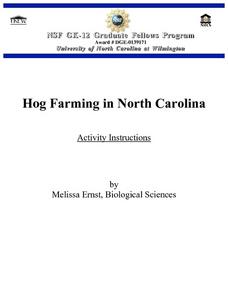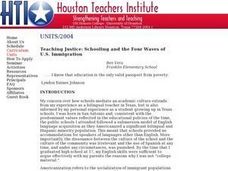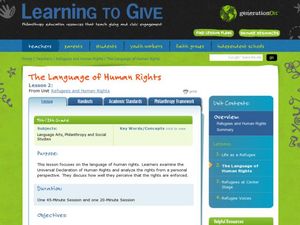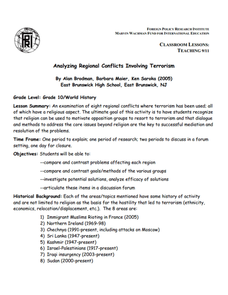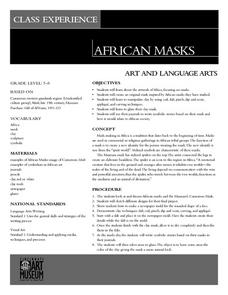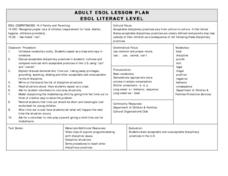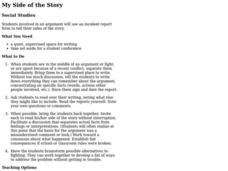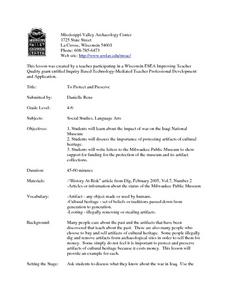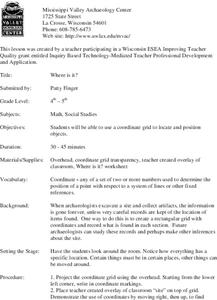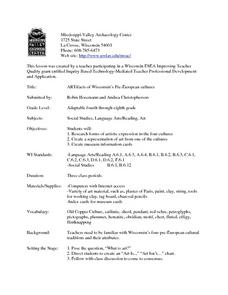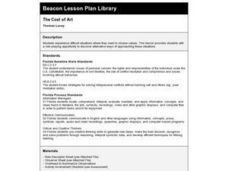Advocates for Youth
Can I Keep Violence out of My Life?
Many teenagers in your class have not experienced violence in their lives, much less as a daily occurance. But some pupils are not so lucky. Bring hope to your class that violence is not an inevitable part of life, and that they can...
US Institute of Peace
What Does Conflict Mean?
Is conflict always bad? Learners begin a unit on conflict resolution with an exercise that defines conflict, reviews common words associated with conflict, and encourages partners to brainstorm conflicts that may have positive results.
Curated OER
Hog Farming in North Carolina
Students assume the role of a scientist hired by the North Carolina Pork Council to mediate legislative reform and farming needs. Students work with the research group to design a more efficient yet cost effective hog lagoon. Designs...
Curated OER
Pieces of an Artifact
Students review what an artifact is and discover what happens when only pieces of the artifact are found. In groups, they are given a picture of a small piece of an artifact found and they are to make the entire drawing of the artifact...
Curated OER
Mapping the Mediasphere
Students compare/contrast the media messages they see in two different communities in their city. They list the elements of art and the principles of design in the photographs they have taken in those two different communities. They...
Curated OER
Teaching Justice: Schooling and the Four Waves of U.S. Immigration
U.S. immigration is the focus of a unit on social justice. Over the course of a school year, young historians read a variety of texts to learn about four waves of immigration that have occurred over time in the U.S. An emphasis on...
NBC
Nutrition, Hydration, and Health
NFL football in science class? Yes, please! In an engaging and motivating three-day lesson, kids take a look at their own nutritional habits and needs compared to those of an NFL player, then experiment with the effects of hydration on...
Curated OER
The Language of Human Rights
Did you know that there are 15.2 million refugees in the world? High schoolers will read "The Universal Declaration of Human Rights" and learn how they can get involved to lower this surprising number. To really encourage involvement,...
Foreign Policy Research Institute
Analyzing Regional Conflicts Involving Terrorism
This is a week-long lesson on analyzing the similarities and differences between sources of tension and terrorism in eight locations around the world. The class is divided into eight groups and assigned one of the locations to research....
Curated OER
Class Experience: African Masks
Students discover the many diverse artwork produced in Africa while focusing upon masks created in tribal groups. They conduct research using a variety of resources and then use the information as samples for inspiration to create their...
Curated OER
Down in the Dumps
After an introduction to municipal sludge, middle school ecologists consider the pros and cons of dumping in the Hudson River Canyon. The class is split into two groups: one to debate in favor or dumping and one to debate against the...
Curated OER
ESOL Family and Parenting
Sstudents discuss disciplinary options when parenting. They compare and contrast what was acceptable in their native country with what is acceptable in America. They list courses that are available to parents. They write one paragraph...
Curated OER
Effigy Mound Activity
Students research effigy mounds of Native people in Wisconsin. They create large models of effigy mounds in a given area based on factual information from their studies and research.
National First Ladies' Library
Terrorism and Tolerance
Students define the concepts of terrorism and tolerance using various resources. They examine the concept of stereotype, consider stereotypes often applied to Arabs, Middle Easterners, and Muslims, and attempt to discredit these...
Curated OER
Using Words to Work Things Out
Third graders discuss ways to use words to solve a conflict. In this conflict resolution lesson, 3rd graders read the book Angela and Alice and discuss the conflict from the story. Students brainstorm ways to solve conflicts among...
Curated OER
To Protect and Preserve
Learners discuss the impact of war on the Iraqi National Museum and the importance of protecting artifacts of cultural heritage. They write letters to the Milwaukee Public Museum to show support for funding for the protection of the...
Curated OER
Preserve is the Word
Students investigate a list of archaeological ethical questions. They select a question/issue and design a 3-minute (maximum) PSA to persuade the public to agree with their idea. They conduct research or interviews with experts to be...
Curated OER
Where is it?
Students use a coordinate grid. They investigate and discuss what caused certain objects to be in specific places. They choose a room in their home to map and place objects in specific locations.
Curated OER
Artifact Identification-What is it?
Students observe an artifact and make an inference about the artifact's purpose. They are going to role-play as archaeologists by using artifacts to hypothesize about the lives of past people.
Curated OER
Artifacts of Wisconsin's Pre-european Cultures
Students research forms of artistic expression in four cultures. They create a representation of art from one of the cultures and create museum information cards. They develop a rubric to evaluate each others work.
Curated OER
Discovering Prehistoric People of Wisconsin
Young scholars list the characteristics of the four main groups of prehistoric people of Wisconsin. They compare the characteristics of the groups of to determine the chronological order of existence in Wisconsin.
Curated OER
Getting our Paws into the Cause
Twelfth graders examine local, state, and/or national animal welfare organization. In this Social Studies lesson, 12th graders research their identified organization. Students develop a planned intervention strategy to help persuade...
Curated OER
The Cost of Art
Fourth graders experience difficult situations where they need to choose values. This instructional activity provides students with a role-playing opportunity to discover alternative ways of approaching these situations.




